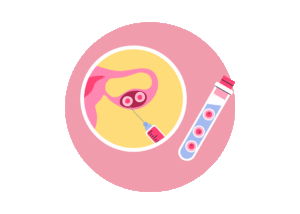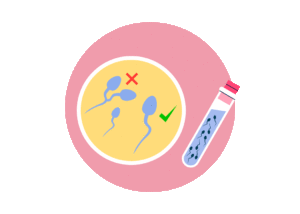
In Vitro Fertilization (IVF) is a beacon of hope for millions of couples and individuals around the world grappling with fertility issues. With one in six couples globally struggling to conceive, according to the World Health Organization (WHO), assisted reproductive technology is more important than ever.
A marvel of modern reproductive technology, IVF is a complex but highly effective process that assists with the conception of a child outside the body. This intricate procedure has evolved significantly since the birth of Louise Brown, the world’s first “test-tube baby,” in 1978. Today, it is a refined sequence of steps, each critical to a patient’s ultimate success:
 1.Initial consultation and pretreatment evaluation — The IVF journey begins with a comprehensive consultation and evaluation. Couples or individuals considering IVF undergo a series of tests and assessments to determine the underlying causes of infertility. These may include blood tests, ultrasounds, tubal evaluation and semen analysis.
1.Initial consultation and pretreatment evaluation — The IVF journey begins with a comprehensive consultation and evaluation. Couples or individuals considering IVF undergo a series of tests and assessments to determine the underlying causes of infertility. These may include blood tests, ultrasounds, tubal evaluation and semen analysis.
Based on these evaluations, a fertility specialist devises a personalized treatment plan, taking into account factors like age, health status and specific fertility issues.
 2.Ovarian stimulation — Unlike a natural monthly cycle where typically only one egg matures and ovulates, IVF requires the development of multiple eggs to increase the chances of successful fertilization. To achieve this, the woman undergoes ovarian stimulation through hormone therapy, usually for eight to 14 days.
2.Ovarian stimulation — Unlike a natural monthly cycle where typically only one egg matures and ovulates, IVF requires the development of multiple eggs to increase the chances of successful fertilization. To achieve this, the woman undergoes ovarian stimulation through hormone therapy, usually for eight to 14 days.
Medications called gonadotropins are administered to encourage the ovaries to produce several eggs. During this phase, the development of the eggs is closely monitored through blood tests and ultrasound scans at a fertility clinic.
 3.Egg retrieval — Once the eggs appear “ready,” a precisely-timed procedure called egg retrieval, or oocyte aspiration, is performed. This minimally invasive surgery is conducted under sedation or anesthesia.
3.Egg retrieval — Once the eggs appear “ready,” a precisely-timed procedure called egg retrieval, or oocyte aspiration, is performed. This minimally invasive surgery is conducted under sedation or anesthesia.
Using an ultrasound-guided needle through the vaginal wall, the eggs are gently removed from the follicles of the ovaries. The procedure typically takes about 10 to 15 minutes, and the collected eggs are immediately transported to the IVF laboratory for the next step of the journey.
 4.Sperm collection and preparation — Concurrently, a sperm sample is obtained from the male partner. (Donor sperm would also be thawed at this time if a frozen sample had been previously stored.) That sample then undergoes a process called sperm washing, which identifies and concentrates the healthiest, most mobile sperm.
4.Sperm collection and preparation — Concurrently, a sperm sample is obtained from the male partner. (Donor sperm would also be thawed at this time if a frozen sample had been previously stored.) That sample then undergoes a process called sperm washing, which identifies and concentrates the healthiest, most mobile sperm.
This preparation is crucial for ensuring that the best candidates are available for fertilizing the retrieved eggs.
 5.Fertilization — Fertilization can be attempted through two primary methods – conventional insemination or intracytoplasmic sperm injection (ICSI). In conventional insemination, the washed sperm and eggs are placed together in a culture dish to allow natural fertilization to occur.
5.Fertilization — Fertilization can be attempted through two primary methods – conventional insemination or intracytoplasmic sperm injection (ICSI). In conventional insemination, the washed sperm and eggs are placed together in a culture dish to allow natural fertilization to occur.
In cases of male factor infertility, ICSI may be employed, where a single sperm is injected directly into an egg to encourage fertilization. The eggs are then monitored to confirm that fertilization and cell division are occurring, indicating proper embryo development.
 6.Embryo culture — The fertilized eggs, now embryos, are kept in a controlled environment in the fertility clinic’s IVF laboratory to support their growth.
6.Embryo culture — The fertilized eggs, now embryos, are kept in a controlled environment in the fertility clinic’s IVF laboratory to support their growth.
During this period, embryologists closely monitor the embryos’ development, assessing their viability for transfer and future use. Many clinics also offer preimplantation genetic testing (PGT) at this stage to screen for major genetic abnormalities, which helps to ensure that only embryos with the best chance of success are transferred. PGT can also screen for embryos that have specific genetic disorders (such as cystic fibrosis or sickle cell disease) if both partners are carriers for the illness.
 7.Embryo transfer — Embryo transfer is the next critical and hopeful step in the IVF process. While multiple embryo transfer was more commonly practiced in the past, elective single embryo transfer (eSET) is now the gold standard within the field of IVF. ESET is the method of selecting a single embryo from a cohort of available embryos, which is then transferred to the uterus. This method has gained prominence for several compelling reasons, primarily focused on reducing the risks associated with multiple pregnancies and enhancing the overall safety and health outcomes for both mother and baby. This procedure is painless and involves placing an embryo in the uterus using a thin, flexible catheter inserted through the cervix. Any additional embryos created, but not transferred, at this time can be cryopreserved (frozen) for future use.
7.Embryo transfer — Embryo transfer is the next critical and hopeful step in the IVF process. While multiple embryo transfer was more commonly practiced in the past, elective single embryo transfer (eSET) is now the gold standard within the field of IVF. ESET is the method of selecting a single embryo from a cohort of available embryos, which is then transferred to the uterus. This method has gained prominence for several compelling reasons, primarily focused on reducing the risks associated with multiple pregnancies and enhancing the overall safety and health outcomes for both mother and baby. This procedure is painless and involves placing an embryo in the uterus using a thin, flexible catheter inserted through the cervix. Any additional embryos created, but not transferred, at this time can be cryopreserved (frozen) for future use.
 8.The two-week wait and pregnancy test – After the embryo transfer, patients enter a period colloquially known as the two-week wait that is actually approximately nine days, culminating in a pregnancy test. This wait can be emotionally challenging, as it marks the end of a complex, often stressful journey.
8.The two-week wait and pregnancy test – After the embryo transfer, patients enter a period colloquially known as the two-week wait that is actually approximately nine days, culminating in a pregnancy test. This wait can be emotionally challenging, as it marks the end of a complex, often stressful journey.
A blood test is conducted approximately nine days after the embryo transfer to measure the levels of human chorionic gonadotropin (hCG), the hormone produced during pregnancy. A positive test indicates a successful implantation and pregnancy.
Understanding success rates and challenges The success of IVF is influenced by numerous factors, including age, diagnosis and lifestyle. While IVF offers the highest chances of success, compared to other common infertility treatments, it’s important for patients to have realistic expectations and understand that it might take multiple cycles to achieve a healthy pregnancy.
The emotional journey
IVF is not only a physical and medical journey but an emotional rollercoaster. The process can be demanding and stressful, filled with anxiety, hope, disappointment, excitement and many other conflicting emotions.
Support from your partner, family, friends or a professional counselor can be invaluable during this time. There are also many organizations that offer free infertility support groups, such as Resolve: The National Infertility Association, Resolve New England and others. At Illume Fertility, we offer weekly support groups that provide those struggling to conceive a chance to connect with other patients who truly understand what they’re going through.
The future of IVF treatment
In Vitro Fertilization (IVF) has revolutionized reproductive medicine, offering countless individuals and couples the chance to pursue their dreams of parenthood. While the journey through IVF can be complex and challenging, it is a testament to the incredible advancements in medical science and the resilience of those who embark on the path to creating a family.
As technology and techniques continue to evolve, the future of IVF holds even greater promise for those facing fertility obstacles.

Alexander Kucherov, M.D. is a fertility specialist at Illume Fertility, with locations in Harrison, Danbury, Norwalk, Stamford and Trumbull. He is board certified in obstetrics and gynecology and reproductive endocrinology and infertility. After graduating from the Albert Einstein College of Medicine with distinction in research honors, he completed his residency and fellowship at Montefiore Medical Center and performed research on recurrent pregnancy loss, male factor infertility and improved birth outcomes with preimplantation genetic testing (PGT).



















